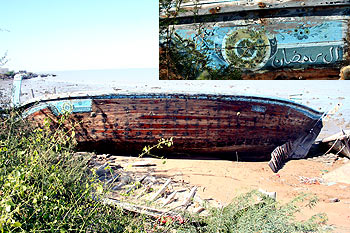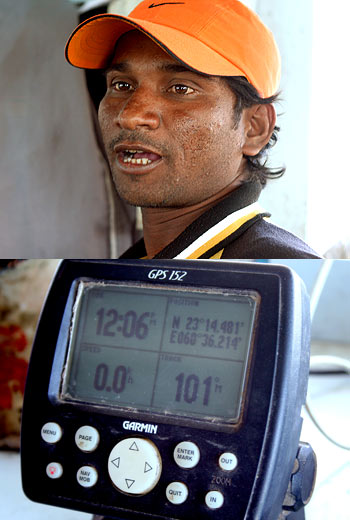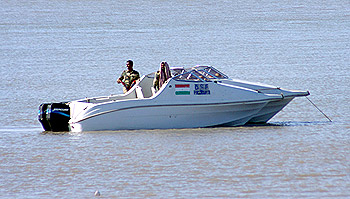Photographs: Sanjay Sawant
Narayan Sarovar, a sleepy little hamlet, some 170 km north west of Bhuj, with a population of 5,000-odd people, has suddenly come alive. One can easily see a sense of heightened activity near the Koteshwar temple, situated right at the sea front, three kilometres away from Narayan Sarovar.
"It has not always been like this," says Naseem Bhai, a local fisherman, who has come back from a two-day voyage out at sea with about 50 kilogrammes of fish that will fetch him about Rs 2,000.
As most of the fishermen here -- all of them Muslim -- have small boats barely 12 to 14 feet long and 5 to 6 feet wide, they don't venture out in the sea for more than two days and that too not beyond a distance of five to eight kilometres.
"You can easily bump into officers and agents from the Intelligence Bureau and Research and Analysis Wing," says Naseem looking at a bevy of plainclothes policemen who keep a vigil over the fishermen as they unload their catch from dirty gunnysacks into the weighing machine.
While armed, uniformed troopers from the Border Security Force's Water Wing are recognisable and ubiquitous, it is easy to miss IB and R&AW agents who could easily be taken for tourists.
This is how the long coastline that India shares with Pakistan has changed ever since ten terrorists shocked India's security establishment out of its stupor. The security agencies seem to have taken serious note of coastal security breaches that could be exploited again by terrorists and have been on a mission to plug them.
Difficult terrain
Image: A naval ship off the coast of Koteshwar.According to him, the Gujarat police's marine wing forms the inner-most ring of the security layer that has been formed to prevent terrorists from entering India, followed by the Coast Guard, the Indian Navy, which exercise its jurisdiction on the high seas, and the BSF that guards the areas around the IMBL.
Last Friday, November 13, BSF commandos chased seven Pakistani fishing boats in the marshy and un-navigable Harami Nala area near the IMBL and prevented one of the several infiltration attempts that are a common feature along this difficult terrain.
"Harami Nala is a small marshy rivulet that meanders through Pakistani side of the IMBL and empties itself out on the Indian side. Only small boats can ply here, that too when there is enough water. One gets stuck in the sand otherwise," says Hassan Bhai, a veteran fisherman from Narayan Sarovar who knows the marshy terrain very well. He has been fishing in and around these waters for the last 20 years.
"Yes, the terrain is really a big problem for the BSF to conduct its operations effectively," says the IB officer.
As the waters in these areas are shallow the BSF could not chase them. So the BSF commandos got off their boats, plodded some four kilometres in the marshy waters to chase the fishing boats away. Some 250 rounds of bullets were fired, reported Divya Bhaskar and Kachchh Mitra, two prominent newspapers in this region.
Stepped-up vigil
Image: Narsi Thakker and the GPS installed on his boat Tej Vishwa at Jakhau.Tandel (captain of a ship) Narsi Thakker, who has just arrived after a five-day voyage in Jakhau, an important port and fishing centre south of Koteshwar, confirms: "The Navy, the Coast Guard and the BSF are making their presence felt in the high seas. My ship was checked at night two days ago by the Coast Guard. So were the ships of my fellow fishermen who sailed with me."
As a precautionary step, the BSF at Koteshwar has cautioned fishermen from venturing out into the sea or coming back to the port after 8 pm. "They say it takes away from their focus of finding enemy ships as they waste their time checking Indian ships who sail at night," says Hassan Bhai.
As the first anniversary of the worst terror attacks in recent Indian history draws near, the Navy too has stepped up its vigil.
As a part of this enhanced vigil a rear admiral visited an "undisclosed location" along the Kachchh waterfront to check the preparations on Monday.
IB agents in Koteshwar stopped rediff.com from photographing the rear admiral who left for an "undisclosed location" off Koteshwar escorted by the BSF's Water Wing's speedboats.
"While it is almost impossible to find out if the people on board were genuine fishermen or terrorists we have to maintain a high level of vigil," an IB officer noted about the Harami Nala incident.
The BSF has detained 14 Pakistani fishermen (security agencies fear one of the men could be a terrorist) who had strayed into Indian waters the last fortnight.
The Coast Guard and the Marine Police have increased the frequency with which they scour Indian waters to keep trouble at bay.
High alert?
Image: BSF commandos in speedboat about to go out on patrol."This sector is always in a state of high alert given the proximity to the Pakistani border and the large number of straying and infiltration attempts in these waters," says a Gujarat Marine police officer who had just returned from a reconnaisance mission off Jakhau when he spoke to rediff.com
It was off the coast of Jakhau that the bodies of four crew members of the ill-fated M V Kuber were discovered last November. The bodies of Kuber's tandel (captain) was found on the boat while another crew member's body was found in the waters off the Mumbai coast.
All of them are believed to have been murdered by the terrorists who captured the fishing boat and used it to travel to Mumbai, arriving there on November 26.
The Gujarat Marine Police officer confirmed that the 14 Pakistani fishermen detained last fortnight have been sent to Junagadh for further questioning.
"There is always a sense of high alert, but nothing that should cause panic," he added.
However, the swarming posse of intelligence agents, the Coast Guard's enhanced presence, the BSF's heightened activity and the presence of a rear admiral seems to indicate otherwise.





article